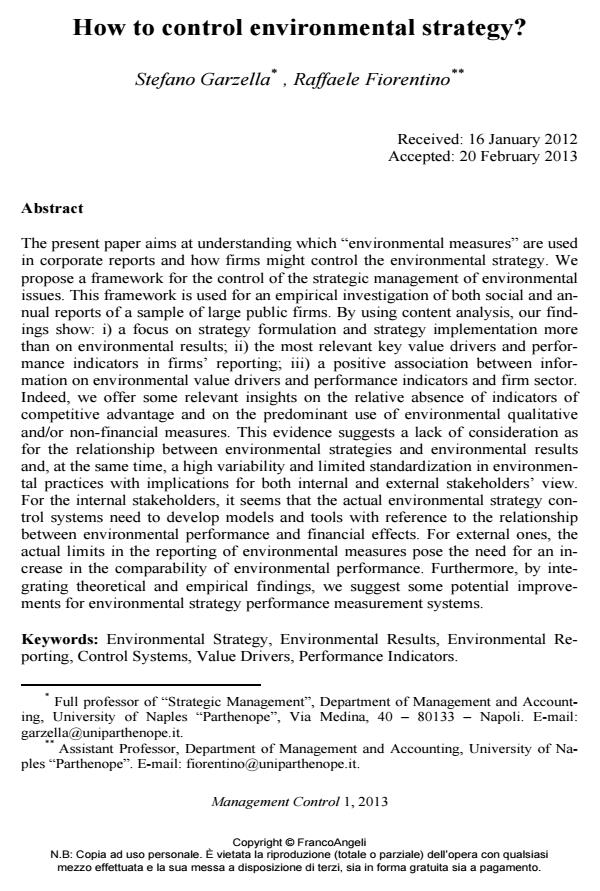How to control environmental strategy?
Titolo Rivista MANAGEMENT CONTROL
Autori/Curatori Stefano Garzella, Raffaele Fiorentino
Anno di pubblicazione 2013 Fascicolo 2013/1
Lingua Italiano Numero pagine 32 P. 45-76 Dimensione file 792 KB
DOI 10.3280/MACO2013-001004
Il DOI è il codice a barre della proprietà intellettuale: per saperne di più
clicca qui
Qui sotto puoi vedere in anteprima la prima pagina di questo articolo.
Se questo articolo ti interessa, lo puoi acquistare (e scaricare in formato pdf) seguendo le facili indicazioni per acquistare il download credit. Acquista Download Credits per scaricare questo Articolo in formato PDF

FrancoAngeli è membro della Publishers International Linking Association, Inc (PILA)associazione indipendente e non profit per facilitare (attraverso i servizi tecnologici implementati da CrossRef.org) l’accesso degli studiosi ai contenuti digitali nelle pubblicazioni professionali e scientifiche
The present paper aims at understanding which "environmental measures" are used in corporate reports and how firms might control the environmental strategy. We propose a framework for the control of the strategic management of environmental issues. This framework is used for an empirical investigation of both social and annual reports of a sample of large public firms. By using content analysis, our findings show: i) a focus on strategy formulation and strategy implementation more than on environmental results; ii) the most relevant key value drivers and performance indicators in firms’ reporting; iii) a positive association between information on environmental value drivers and performance indicators and firm sector. Indeed, we offer some relevant insights on the relative absence of indicators of competitive advantage and on the predominant use of environmental qualitative and/or non-financial measures. This evidence suggests a lack of consideration as for the relationship between environmental strategies and environmental results and, at the same time, a high variability and limited standardization in environmental practices with implications for both internal and external stakeholders’ view. For the internal stakeholders, it seems that the actual environmental strategy control systems need to develop models and tools with reference to the relationship between environmental performance and financial effects. For external ones, the actual limits in the reporting of environmental measures pose the need for an increase in the comparability of environmental performance. Furthermore, by integrating theoretical and empirical findings, we suggest some potential improvements for environmental strategy performance measurement systems.
Parole chiave:Environmental Strategy, Environmental Results, Environmental Reporting, Control Systems, Value Drivers, Performance Indicators.
- Corporate Environmental Strategies and Value Creation Rosita Capurro, pp.9 (ISBN:978-3-030-67277-5)
- Sustainability strategies and stakeholder relationships: A multiple case study in the fashion industry Roberto Cerchione, Rosita Capurro, Stefano Marciano, in MANAGEMENT CONTROL 2/2025 pp.13
DOI: 10.3280/MACO2025-002002 - Strategie di sostenibilità: dalle motivazioni ai sistemi di misurazione della performance Raffaele Fiorentino, Stefano Garzella, Rita Lamboglia, Daniela Mancini, in MANAGEMENT CONTROL 2/2016 pp.115
DOI: 10.3280/MACO2016-002006 - Il ruolo degli strumenti di cost management nello sviluppo di nuovi prodotti sostenibili Riccardo Giannetti, Alessandro Marelli, in MANAGEMENT CONTROL 2/2016 pp.33
DOI: 10.3280/MACO2016-002003 - The Strategic Intelligence implications for Information Systems Michele Galeotti, Stefano Garzella, Raffaele Fiorentino, Gaetano della Corte, in MANAGEMENT CONTROL 1/2016 pp.105
DOI: 10.3280/MACO2016-001007 - La sostenibilità ambientale in azienda: quale relazione tra disclosure volontaria e gestione interna? Lino Cinquini, Emilio Passetti, Andrea Tenucci, in MANAGEMENT CONTROL 2/2016 pp.15
DOI: 10.3280/MACO2016-002002
Stefano Garzella, Raffaele Fiorentino, How to control environmental strategy? in "MANAGEMENT CONTROL" 1/2013, pp 45-76, DOI: 10.3280/MACO2013-001004